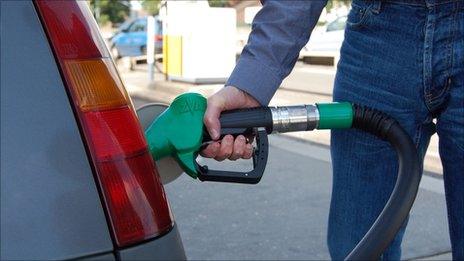Budget 2011: How the fuel duty cut is funded
- Published

The chancellor's efforts will not stop prices at the pump from rising
Chancellor George Osborne's move to cut fuel duty was well heralded, but it is not the fuel duty stabiliser he spoke about in opposition.
Instead he has introduced a less effective stabiliser - one that will cost him less.
Under the announced changes, the cost of fuel will not be kept the same regardless of fluctuating oil prices.
The chancellor admitted he could not simply raise and lower taxes to ensure this, since doing so would be too costly.
Instead, Mr Osborne will follow Gordon Brown in raising the supplementary charge on the North Sea oil industry whilst the price of oil remains above $75.
This will raise some £2bn ($3.3bn), which can be used to fund the 1p fuel duty cut, along with a postponement of a 4p inflation-linked cut.
This total decrease in the planned fuel duty of around 5p in real terms will come into effect at 1800GMT on Wednesday.
If the price of oil falls below $75, however, the fuel duty goes back up and the tax on oil companies back down.
Oil money
The fall in fuel duty is not as generous as it first seems when taking into account the 2.5 percentage points increase in tax on petrol that accompanied the VAT rise from 17.5% to 20% in January.
And the fuel duty will continue to rise with inflation, although this year's 4p increase is now delayed until January and the next planned inflation-linked rise will be delayed until the following summer.
Moreover, as the price of oil rises, so will the tax the government receives from the North Sea oil companies.
In the short term, the Office for Budget Responsibility (OBR) and the National Institute of Economic and Social Research (NIESR) estimate that every £10 increase in the price of oil equates to around £2.5bn extra for the exchequer.
That is the money that Mr Osborne had initially hoped he would be able to use to cut the price at the pump by varying taxes.
But the OBR warned that this extra income would be offset by money lost in other taxes.
High oil prices make it more expensive for companies to do business - driving down profits, wages and the taxes paid by companies and employees not involved in North Sea oil.
The OBR forecasts that over the first year a £20 increase in the cost of oil would cost more than £3bn in lost revenue.
Then there is the impact of inflation - currently at more than double the target.
This pushes up interest on government debt and the costs of some benefits, more than £1bn, according to the independent forecaster.
All in all, the OBR and NIESR both conclude that over the first year the government will gain very little from a rising oil price.
New tax
Instead, the chancellor has increased a supplementary tax on oil companies from 20 to 32% - following on from Labour's 2002 increase.
It means oilfields in the UK are now taxed at between 60% and 85%, depending on their age.
The new tax will raise about £2bn in extra revenue.
The OBR calculated that each cut in fuel duty of 1p costs about £500m.
And because the cuts are not all coming in at once, it allows the chancellor to fund the cuts announced in the Budget.
Long term
Problems remain over the longer term.
If the oil price continues to rise, this will still hit the forecourt.
The OBR calculated that each £10 increase in the cost of oil equates to 7.4p on the cost of fuel.
The chancellor's cuts also do not affect the larger element of fuel duty rises - that linked to inflation.
The built-in 4p increase planned for April will still take place - it has merely been delayed until January.
And the inflation-linked increase planned for next April will take place too, during the following summer.
The rate of inflation, therefore, will have a far larger impact on duty rises than the new stabiliser over the coming years.
Finally, if oil prices remain high, the OBR forecasts the exchequer will actually lose money over the longer term
The OBR predicts that if the cost of fuel remains £20 more than the level in September for four years, the negative impact on the economy - and the Treasury - will be up to £7bn a year.
That would make it even harder to sustain further cuts in fuel duty.